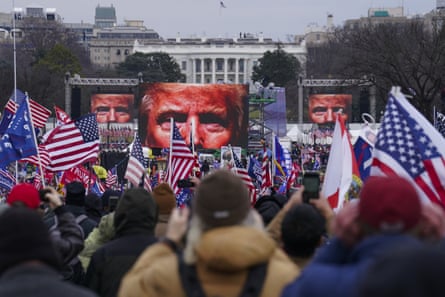There is little doubt that Donald Trump will refuse to accept a defeat in November’s US presidential election.
The former president, who is deadlocked in the polls with Kamala Harris, has spent months priming his supporters to believe the only way he could lose is through fraud. “If I lose – I’ll tell you what, it’s possible. Because they cheat. That’s the only way we’re gonna lose, because they cheat,” he said at a rally in September.
He has refused to say, several times, that he will unequivocally accept the results of the election, only going as far to say that he will if “it’s fair and legal and good”. Having escaped any accountability for the attack on the Capitol on January 6, he has embraced those who violently attacked the US government to protest against the 2020 election results, calling it a “day of love”.
JD Vance, his running mate, has, at times, been even more forthright. The Ohio senator has said he would not have certified the 2020 race. During the vice-presidential debate in early October, he refused to say that Trump lost the 2020 election. He later said, more definitively, that he did not believe Trump lost four years ago.
But this year the Trump ticket’s efforts to pre-emptively deny the results in case of a loss of the election go beyond rhetoric. They are now backed up by widespread party support and a highly organized, massive legal apparatus.
“The effort to try to subvert the outcome is more thought-out, more strategic, more organized, more coordinated in 2020,” said Sean Morales-Doyle, director of the voting rights program at the Brennan Center for Justice.
Republicans are primed to support Trump’s efforts. Nearly one in five Republican voters believe Trump should declare the election result invalid if he loses, according to a recent survey by the Public Religion Research Institute (12% of Democrats said Harris, who has committed to accepting the election results, should do the same).
Dozens of people who have challenged the results of the last presidential election are in local offices where they have power over certifying vote totals. Led by Cleta Mitchell, a Trump ally who aided his efforts to overturn the election four years ago, Republicans have organized a massive effort to monitor election offices, challenge voters, and work in election precincts.
At least 35 officials who have refused to certify elections since 2020 will have a role over certifying the vote this fall, according to a report by Citizens for Responsibility and Ethics in Washington (Crew), a watchdog group.
The Republican National Committee has spent months filing frivolous lawsuits that contain specious allegations of fraud. Legal experts say Republicans have no chance of winning the suits ahead of the election – many have already been thrown out of court – but they are instead designed to generate headlines and create the impression that something is amiss with the voter rolls.
The Harris campaign, voting rights lawyers, and civil rights groups are all preparing for the possibility of a chaotic post-election period that could include a flood of lawsuits trying to get ballots thrown out in an attempt to swing the election.
While there is little doubt that Trump will try and contest an election loss, experts are also nearly certain that he will not succeed. Judges turned away nearly every case Trump filed to try and overturn the election results – 61 in total – and experts expect that they will do so again.
Lawyers and election officials have also spent the last four years learning from what happened and are prepared to swiftly go to court at the first whiff of disruption. The month following election day could be chaotic and confusing, but they’re confident that the rightful winner of the election will ultimately be certified.
“The response to these attempts is also more coordinated and prepared. Election officials have seen what the election deniers playbook looks like over the last couple of elections and know what to prepare for,” Morales-Doyle said.
Vote-rigging allegations
Trump’s effort to contest a possible loss is likely to begin as votes are counted on election night. Just like 2020, it is likely that there will not be a winner declared on election night and key swing states are going to take hours or even days to count their ballots. The closer the election margin – and it could be very close this year – the longer it will take for news outlets to be confident enough to call the race, which could add to the uncertainty.
There’s nothing unusual about that lag. But Trump is planning to declare that the vote against him is rigged and that the slow count is evidence something is amiss, Rolling Stone reported in October.
That declaration of fraud is likely to be accompanied by swift lawsuits alleging various irregularities with the vote, supported by affidavits from people who say they saw something unusual at the polls or when workers are counting votes. While those claims are likely to be debunked, they’re likely to fuel the narrative that something wrong happened in 2020.
The Republican National Committee is already forecasting what these suits will look like. Over the last several months, they have filed suits in swing states alleging that states have dead people, non-citizens and other ineligible people on their voter rolls and asked courts to remove them. Judges have already tossed many of the lawsuits.
In Michigan, a swing state, for example, the Republican National Committee filed a lawsuit in March claiming that 76 of the state’s 83 counties had more eligible voters than citizens eligible to vote or “suspiciously high” voter registration rates. The RNC sent out a press release accompanying the suit, saying it showed Michigan had “inflated and inaccurate voter rolls ahead of the 2024 election” and the suit earned many headlines.
Michigan officials noted that the RNC had not identified a “single voter in any Michigan county who is ineligible to be registered but nonetheless appears as an active voter.” A federal judge dismissed the case on 22 October, finding that Michigan already had reasonable procedures for removing voters (federal law requires a waiting period before a state can remove a voter it suspects has moved from rolls).
The watchdog group Protect Democracy calls these and similar lawsuits “zombie lawsuits” and predicts that Trump and allies could try and revive them after election day to challenge the election results.

Nikhel Sus, a lawyer with Crew, predicted Trump and allies would revive some of the suits they’ve already filed, but that they wouldn’t go far.
“We’re going to see these zombie lawsuits come back to life in a strategic tactical way. And perhaps that was the goal from the outset,” he said. “You still need evidence to win a court case.”
Filing a case challenging voter eligibility before the election doesn’t give it a better chance of succeeding afterwards, Morales-Doyle of the Brennan Center said. Still, he said the litigation gives a false imprimatur to Trump’s claims of fraud.
“I do think you’re going to see after the election if people are upset about the outcome, pointing to “we’ve been saying for the last 8 months that they had bloated rolls and dead people on the rolls. Non-citizens on the rolls and the courts didn’t do anything about it,” he said.
After those suits are filed, Trump could move on to trying to stop certification of the vote at the local level. Long a little-followed process of elections, certification takes place at the local and state level to officialize vote totals after all of the ballots are tallied. Local boards – often staffed with party loyalists or little-known government officials – are responsible for undertaking this task, and generally do not have discretion not to certify.
But since 2020, Trump-aligned Republicans have embraced the idea that officials can refuse to certify the vote, something voting experts say is illegal. Across the country this year, officials on local boards of election have refused to certify primary and other elections, citing vague concerns about fraud. None of those efforts have been successful, and all of the boards have been forced to certify the results in the end.
Georgia, one of the seven battleground states, has been at the center of this push. Republican commissioners in Fulton county, home to Atlanta, have refused to certify elections twice this year. Trump-aligned Republicans on the State Election Board also passed last-minute rules this year that could have paved the pathway for local election officials to not certify the vote in November. A local judge blocked the rules, and said that discretion in the state is mandatory.
Nonetheless, Sus said he still expects that there will be local officials throughout the country who refuse to certify the vote, forcing groups to go to court to force certification.
-
Don’t miss important US election coverage. Get our free app and sign up for election alerts
“Even though it’s illegal and there will be potential stiff legal consequences for doing that sort of thing, it will cause some level of disruption,” he said. “There is a chance that by sowing distrust at the county level if president Trump loses the election that they’re going to lay the groundwork to dispute the results on January 6 2025 on the grounds that there was uninvestigated fraud or irregularities in particular states.”
Trump and Republicans could try and bring a final challenge when Congress issues the final certification of the electoral college vote on January 6, 2025. But they would find additional hurdles there.
In December 2022, Congress passed a bipartisan bill, the Electoral Count Reform Act, that made it harder to interfere with its certification of the electoral vote. Among other things, it made it harder for members of Congress to object to the electors, clarified that the vice president (Harris in 2025) cannot interfere with the vote count, and made it clear that only the governor of a state can certify a legitimate slate.
Narrative of voter fraud
In 2020, Trump pointed to the massive shift in mail-in voting and emergency changes in voting, driven by the pandemic, to create a narrative of fraud and claim the election was stolen. In 2024, Trump has shifted his focus to something else: non-citizen voting.
Several studies have shown that non-citizen voting is incredibly rare. And it is already illegal for non-citizens to vote in federal elections. Yet over the last year, Mitchell and other Republicans have led a robust campaign to seed the idea that non-citizen voting could affect Americans elections.
Earlier this year, Republicans passed a bill in the US House that would have required proof of citizenship to vote and outlawed non-citizen voting, something that is already illegal. It helped kickstart a the false narrative that Democrats are allowing non-citizens to cross the border to influence elections.
“Our elections are bad,” Trump said during the 10 September debate with Kamala Harris. “And a lot of these illegal immigrants coming in, they’re trying to get them to vote. They can’t even speak English. They don’t even know what country they’re in practically. And these people are trying to get them to vote. And that’s why they’re allowing them to come into our country.”
Other top Republicans have followed suit and amplified the false claims. And Republican election officials in a handful of states – Alabama, Texas, Virginia, and Tennessee – have all tried to back up Trump by releasing statements claiming to have found thousands of non-citizens on the rolls. Many of those announcements have been based on misleading methodology and further investigation has shown that many of those flagged have been eligible voters.
Elon Musk, the billionaire owner of X and a major backer of Trump, has significantly helped boost these lie that Democrats want non-citizens to vote, posting about it at least 52 times and racking up 700m views, according to an analysis by the Washington Post.
The Heritage foundation, a rightwing thinktank aligned with Trump, has peddled misleading videos purporting to show non-citizen registering. Other Republicans have also added to the rhetoric. “[Democrats] want illegals to vote now that they opened the border,” Steve Scalise, a top Republican in the US House, said in his speech at the Republican National Convention in July.
If Trump contests the election, the lie about non-citizen voting is likely to be at the center of his efforts.
David Becker, the executive director of the Center for Election Innovation and Research, said the emphasis on non-citizen voting was a clear effort to set the stage to claim the election was stolen.
“This will be one of the primary, but among many, false claims made if Trump loses,” he said in September. “And it will be false, but it still could be dangerous because it could incite his supporters to believing a totally secure election was stolen.”
‘There’s real harm being done’
Even though he’s confident that any effort to overturn the results of the election will be unsuccessful, Morales-Doyle is still worried about the long-term effects on American politics.
Democracies, he said, depend on people believing that their leaders are legitimately elected and that belief is rooted in the idea that elections are legitimate. Weakening the belief in the results of an election weakens that fundamental piece of a democratic society.
As election night approaches, Morales-Doyle said he was concerned about the long-lasting effects that questioning the election results would have.
“Democracy only works if people believe in it. And this is a whole movement that’s built around distrust of our elections and spreading that distrust and I think that’s really harmful,” he said. “I’m fairly confident that our institutions will hold and we will show once again that we have a resilient democracy in 2024, but I think that there’s real harm being done in the long term to our democracy by these attacks and these attempts to sow distrust.”

 By The Guardian (World News) | Created at 2024-10-26 11:20:14 | Updated at 2024-10-26 13:33:18
2 hours ago
By The Guardian (World News) | Created at 2024-10-26 11:20:14 | Updated at 2024-10-26 13:33:18
2 hours ago



